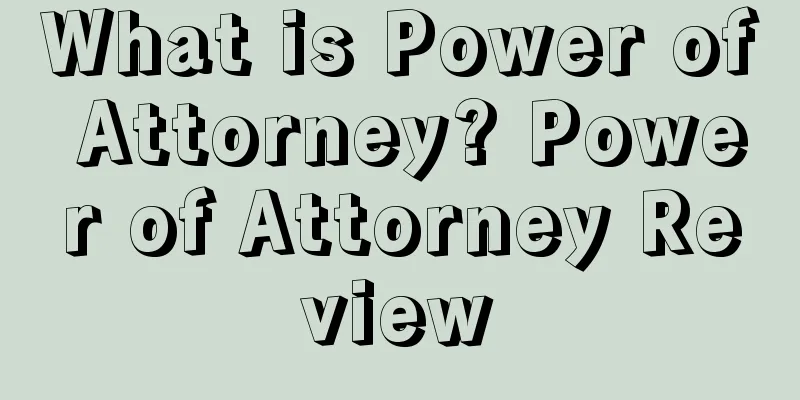What is Power of Attorney? Power of Attorney Review

|
Power of Attorney (POA ) is a letter of authorization or a letter of appointment that is used to authorize another person to handle matters on your behalf in certain circumstances. 1. About Power of Attorney A power of attorney is a legal document. When you give someone a power of attorney, you are giving him or her the legal authority to handle financial and legal matters on your behalf: this may include paying bills, depositing or withdrawing money from your bank account, investing your money or selling your house on your behalf. The person authorized by you is called an "Attorney" (Attorney does not mean a lawyer), and you are called an "Adult". The power of attorney does not give the trustee the power to decide matters related to your medical care. The scope of authorization only involves financial and legal matters. 2. Usage Examples For example, if I ship a DDU shipment to the United States, the U.S. consignee needs to give my U.S. branch a POA authorization for customs declaration and an EIN number, so that my U.S. branch can clear customs for him. The POA is equivalent to a customs declaration power of attorney, and the EIN number is equivalent to the customs registration number. 3. Classification of power of attorney 1. General Power of Attorney This type of power of attorney has a wide range of applications, including handling property sales, mortgage loans, and even handling withdrawals, deposits, and general matters in bank accounts. In other words, this is an unlimited authorization, and as long as it is legal, the authorized person can sign and handle matters on behalf of the authorized person. A general power of attorney is usually made to a relative or a person you trust, most commonly between a husband and wife, or between parents and children. If the parents are old and do not understand English, they will entrust their children to handle all matters on their behalf. A power of attorney is generally valid for three years, but if you want the power of attorney to continue to be valid after three years, you must specifically inform your lawyer in advance when making the power of attorney and include specific terms. 2. Specific Power Of Attorney A designated power of attorney is to specifically specify that you are entrusting someone to do a specific thing. For example, you may only entrust someone to purchase a property and specify the address of the property to be purchased. Apart from this, they cannot handle other matters on your behalf. This type of designated power of attorney is often given to siblings or friends to complete the agency tasks at one time. IV. Powers and Responsibilities of the Trustee A trustee is like your "agent" and must act loyally and make good decisions in your best interest. Your trustee must keep careful records of any financial activity and must keep your affairs separate from his or her own. The trustee's powers depend on the type of power of attorney. A "general power of attorney" gives the trustee the power to perform any financial or legal duties on your behalf that you cannot perform for yourself. This may include handling bank or credit union accounts, obtaining information from the Canada Revenue Agency to file your taxes, insuring or selling your car, or selling your property. If you want to limit the scope of the trustee's powers, you can also make a "specific power of attorney" for specific tasks. For example: A trustee can only sell a specific property and impose a time limit on the sale. 5. Frequently Asked Questions Q:What do I need to know when signing a power of attorney? A: You must sign the Power of Attorney in the presence of a witness. If you hire a notary public or lawyer, you only need one witness. The appointed attorney must also sign the Power of Attorney document in the presence of the witness before they can perform their duties. You and your attorney do not have to sign at the same time. Q: If the signing witness in the power of attorney dies, is the power of attorney still valid? A: Valid. Q: If there are two or more power of attorney, which one is valid? A: The one with the latest date is valid. For example, there are two power of attorney, one signed on January 20, 2017, and the second signed on February 3, 2017. The second one is valid. Q: Is it possible that the power of attorney may be challenged? A: Yes, but only the court can make the final decision. Q: How can I reduce the possibility of my power of attorney being questioned? A: Strictly follow the drafting and signing requirements. Or ask a legal worker to draft it. Q: Can I cancel the power of attorney? A: You can cancel at any time. Q: How to cancel a power of attorney? A: The cancellation of authorization must be in writing. Q: Can the power of attorney be found in the government’s public document records? A: No. The power of attorney is not registered with the government and cannot be checked. However, if the power of attorney is drafted by a lawyer or legal advisor, the client can ask the lawyer or legal advisor to keep a copy for future reference. Q: Some banks have continuous or non-continuous power of attorney forms. Can I use them? A: Most banks' power of attorney only concerns your power of attorney for your bank account, and does not include the power of attorney for your other property. In addition, the bank's power of attorney format is not personalized. If you have requirements for your own situation, it is not suitable for use. Please read it carefully and ask clearly before use. If you are uncertain, unwilling, or unaware, do not sign. Remember. Remember. Q: Storage of continuing power of attorney. A: Keep it at the trustee’s place, or in a safe and reliable place where the trustee can get to it, or in the lawyer’s office. Q: When does a continuing power of attorney take effect? A: It will take effect immediately after the client signs. Q: As my agent, can he ask for fees? A: Yes. Q: Is my trustee obligated to protect my privacy? A: Information about your property is private and the trustee is obligated to protect your privacy. Q: What if I lose my capacity to act independently but do not have a continuing power of attorney? A: It is quite troublesome. Your family or relatives will go through the application process to become your property guardian. The application and approval takes time. References |
<<: What is Wish Yellow Diamond? Wish Yellow Diamond Review
>>: What is WishPost? WishPost Review
Recommend
Amazon has lifted its inventory restrictions? No more worries about replenishing goods during peak season
Amazon recently announced that it will gradually ...
What is Cross-border Tongbao? Cross-border Tongbao Review
Cross-border Tongbao E-commerce Co., Ltd. (referre...
What is BookMyShow? BookMyShow Review
BookMyShow was founded in Mumbai in 2007. It is an...
Amazon's big seller files for bankruptcy! A large number of sellers cut their orders in half!
Since 2022, in an environment where the global mar...
What is TopCashback? TopCashback Review
TopCashback is a British shopping rebate website f...
What is FNSKU? FNSKU Review
FNSKU is a barcode automatically generated by the ...
What is MUAA? MUAA Review
Multi-User Account Access (MUAA) is a new feature ...
What is Juxiang Cross-border Fingerprint Browser? Juxiang Cross-border Fingerprint Browser Review
JXExplorer is an improvement based on the Chrome p...
Amazon's return policy loophole was discovered! A seller stole 4.95 million and was arrested
Recently, Amazon broke the news that someone took...
"Amazon's front-end has undergone major changes, and sellers' pressure has increased dramatically: an in-depth analysis"
text As a giant in the e-commerce field, Amazon of...
Lowe's second quarter GMV exceeded expectations by over $27.5 billion! First half revenue was $51.9 billion!
It is learned that on the 18th, Lowe's release...
ThredUp tests consignment fees, cleanup fees and new return policies in pursuit of profitability!
Marking a major shift in ThredUp’s value propositi...
Google officially opens Bard public beta, starting with the UK and the US
It is learned that on March 21, Google announced t...
What is Wesfarmers? Wesfarmers Review
Wesfarmers Limited (OTC: WFAFY, WFAFF, ASX: WES) w...
Starting from scratch, Shopify's 30-day store opening tutorial - Day 11
How to prevent shopping cart abandonment? In prev...









